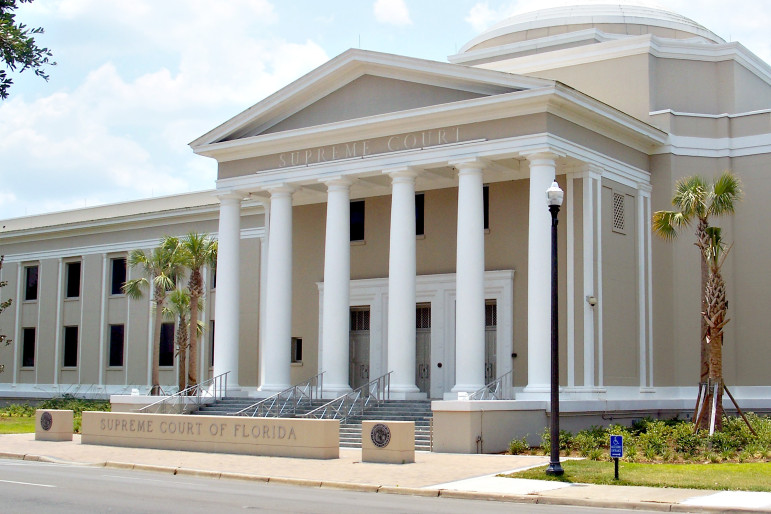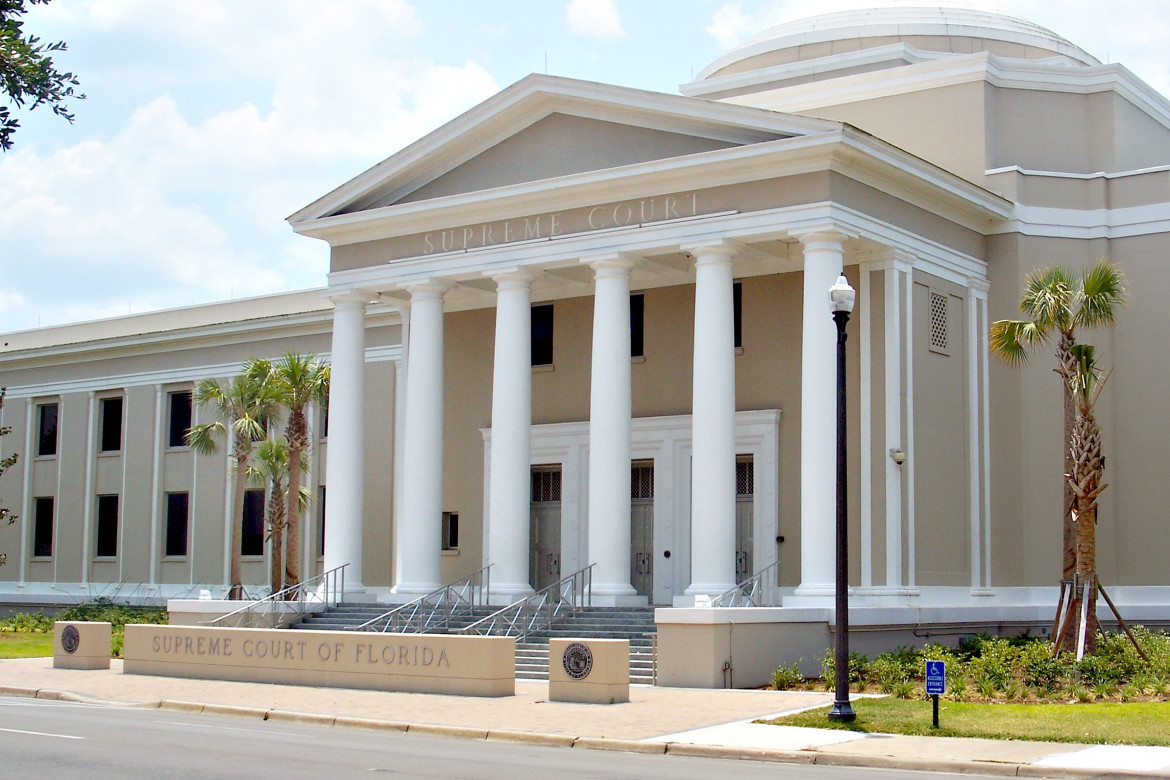
Wikimedia Commons
“The Florida Supreme Court ... reflects the growing momentum across the United States toward fairer and more age-appropriate sentences for youth.” - Heather Renwick of the Campaign for the Fair Sentencing of Youth.
WASHINGTON — Juvenile justice advocates hailed Friday four key Florida Supreme Court decisions on life without parole and other extremely long sentences imposed on children.
The decisions invoked U.S. Supreme Court rulings declaring unconstitutional mandatory sentences of juvenile life without parole (JLWOP) for murder and all JLWOP sentences for nonhomicide offenses.
The Florida high court’s decisions came Thursday — a day before the U.S. Supreme Court considered in a closed-door conference petitions asking it to weigh whether its landmark 2012 Miller v. Alabama ruling declaring JLWOP sentences unconstitutional should apply retroactively.
The seven-justice Florida Supreme Court ruled unanimously that new sentencing hearings must be granted to two people sentenced to JLWOP for murder and to two others serving de facto life sentences of 90 and 70 years for nonhomicide felonies.
“The Florida Supreme Court in these four decisions really reflects the growing momentum across the United States toward fairer and more age-appropriate sentences for youth,” said Heather Renwick, litigation counsel for the Washington-based nonprofit Campaign for the Fair Sentencing of Youth (CFSY).
“All four of these decisions reflect this growing understanding that no child should be sentenced to life in a prison, whether that’s a life-without-parole sentence or a 70- or 90-year sentence because children are uniquely capable of change, and sentencing a child to life imprisonment is inconsistent with children’s capacity to grow.”
CFSY, which opposes sentencing juveniles to life imprisonment, reports Florida now has 195 people who received mandatory life sentences for crimes they committed as children. Florida is among the top five states to sentence children to life without parole.
Those 195 people now have two years to pursue resentencing, the Florida Supreme Court said.
Nationwide, about 2,100 people are serving mandatory life without parole sentences for murders committed as juveniles, the Juvenile Law Center says.
Emily Keller, a staff attorney at the nonprofit, Philadelphia-based Juvenile Law Center, which filed amicus briefs in three of the cases before the Florida Supreme Court, also said she was heartened by the decisions.
“In these four decisions, the Florida Supreme Court recognized the importance of ensuring that juveniles receive constitutionally appropriate sentences that reflect their capacity for rehabilitation,” Keller said.
“The Florida court recognized that children are different for the purposes of sentencing and that their age and potential for rehabilitation mean that they should not be sentenced as if they are simply miniature adults.”
But Tamar R. Birckhead, an associate professor of law and director of clinical programs at the University of North Carolina School of Law, had a tempered reaction to the decisions.
“Yes, the decisions reflect opposition to extreme sentencing of youth,” Birckhead said in an email. “But whether that opposition is growing is a matter of interpretation and counting of the very clearly split state and federal decisions, both on the question of Miller retroactivity and on the question of whether lengthy term-of-year sentences for non-homicides are, in practice, ‘life’ sentences.”
Florida becomes the 10th state whose courts have ruled the 5-4 Miller v. Alabama decision should apply retroactively. (The other states are Illinois, Iowa, Massachusetts, Mississippi, Nebraska, New Hampshire, South Carolina, Texas and Wyoming.) Courts in four states — Louisiana, Michigan, Minnesota and Pennsylvania — have decided Miller does not apply retroactively.
The U.S. Supreme Court has not decided definitively whether to apply Miller retroactively.
In a 22-page ruling in one of the Florida cases, Falcon v. Florida, the Florida high court stated, “We conclude that the rule set forth in Miller constitutes a ‘development of fundamental significance’ and therefore must be given retroactive effect.”
The appellant in that case, Rebecca Falcon, was 15 in 1997 when she took part in a robbery that resulted in the death of a cab driver near Panama City, Fla. She was sentenced in 1999.
The Florida high court, citing Miller, found that the mandatory JLWOP sentence imposed on Falcon violated the Eighth Amendment’s prohibition on “cruel and unusual punishment.”
In another decision, the Florida Supreme Court ordered a new sentencing hearing for Anthony Horsley, who was 17 in June 2006 when he fatally shot the owner of a convenience store in Palm Bay, Fla., during a robbery. He was convicted of first-degree murder in 2011 and sentenced to mandatory life without parole.
His sentencing came before a 2014 Florida law eliminating JLWOP in response to the Miller decision, and he is thus entitled to a resentencing hearing, the Florida Supreme Court found.
In its decisions, the Florida Supreme Court also cited the 2010 U.S. Supreme Court decision Graham v. Florida. In Graham, the court ruled it unconstitutional to sentence juvenile offenders to life without parole for nonhomicide felonies.
In its other two decisions, the Florida court decided new sentencing hearings must be granted to Leighdon Henry, serving a 90-year sentence for rapes and other felonies, and for Shimeeka Gridine, serving a 70-year sentence for attempted first-degree murder and other offenses he committed at age 14.
Birckhead called the Henry and Gridine rulings “significant,” but added, “It’s too early to say whether they represent a trend.”
She said she’s particularly heartened that the Florida Supreme Court held that Graham applied in Gridine, an attempted murder conviction, even though Graham’s language seems to limit the decision to defendants "who do not kill, intend to kill, or foresee that life will be taken."
Florida’s Supreme Court found in Gridine that the 70-year sentence did not provide a meaningful opportunity for release and is therefore unconstitutional under Graham.
Birckhead said the Henry decision is a positive sign that what amount to life sentences for nonhomicide crimes will be considered “virtual ‘life’ sentences.”
The Florida high court noted that the U.S. Supreme Court has cited research showing juveniles’ brains are not fully developed, and youths are more susceptible than adults to peer pressure, more impulsive, more likely to take risks and less likely to consider long-term consequences. The U.S. Supreme Court also pointed to research showing juveniles are amenable to rehabilitation.
(The four Florida Supreme Court full opinions as well as transcripts and videos of oral arguments can be found on the court’s website.)
